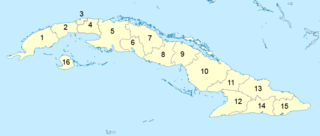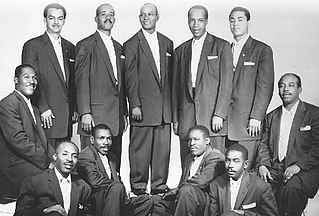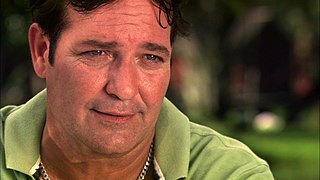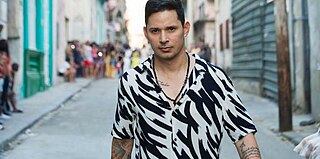Related Research Articles

Arturo Sandoval is a Cuban-American jazz trumpeter, pianist, timbalero, and composer. While living in his native Cuba, Sandoval was influenced by jazz musicians Charlie Parker, Clifford Brown, and Dizzy Gillespie. In 1977 he met Gillespie, who became his friend and mentor and helped him defect from Cuba while on tour with the United Nation Orchestra. Sandoval became an American naturalized citizen in 1998. His life was the subject of the film For Love or Country: The Arturo Sandoval Story (2000) starring Andy García.

Administratively, Cuba is divided into 15 provinces and one special municipality. The current structure has been in place since August 2010, when the then-La Habana Province was divided into Artemisa Province and Mayabeque Province.
The music of Cuba, including its instruments, performance, and dance, comprises a large set of unique traditions influenced mostly by west African and European music. Due to the syncretic nature of most of its genres, Cuban music is often considered one of the richest and most influential regional music in the world. For instance, the son cubano merges an adapted Spanish guitar (tres), melody, harmony, and lyrical traditions with Afro-Cuban percussion and rhythms. Almost nothing remains of the original native traditions, since the native population was exterminated in the 16th century.

Dionisio Jesús Valdés Rodríguez, better known as Chucho, is a Cuban pianist, bandleader, composer and arranger whose career spans over 50 years. An original member of the Orquesta Cubana de Música Moderna, in 1973 he founded the group Irakere, one of Cuba's best-known Latin jazz bands.
Orquesta Aragón is a Cuban musical band formed on 30 September 1939, by Orestes Aragón Cantero in Cienfuegos, Cuba. The band originally had the name Ritmica 39, then Ritmica Aragón before settling on its final form. Though they did not create the Cha-cha-cha, they were arguably the best charanga in Cuba during the 1950s and 1960s. Their trade-marks included high-class instrumentalists playing in tight ensemble style, and rhythmical innovations which kept their sound up to date. Over the years they progressed from their start as a danzoneria to play a wider variety of styles, danzón, then cha-cha-cha, then onda-cha, pachanga and son fusions. They still perform today, based in Havana.

Enrique Jorrín was a Cuban charanga violinist, composer and music director. He is considered the inventor of the cha-cha-chá, a popular style of ballroom music derived from danzón.
Cha-cha-chá is a genre of Cuban music. It has been a popular dance music which developed from the Danzón-mambo in the early 1950s, and became widely popular throughout the world.
Habana Abierta is a Cuban band. They are a member of a generation of composers, musicians, sculptors, authors, actors, etc. which emerged in the early 90s with its own identity in Havana, even though some of their creations had already been well known for some years in the island's cultural circles.
Cuban folk music includes a variety of traditional folk music of Cuba, and has been influenced by the Spanish and the African culture as well as the remaining indigenous population of the Caribbean.

Conjunto Chappottín, also known as Chappottín y sus Estrellas, is a Cuban son conjunto from Havana. It was founded in 1950 by trumpeter Félix Chappottín, pianist Lilí Martínez, singer Miguelito Cuní and other members of Arsenio Rodríguez's conjunto, which was partially disbanded after his departure to the US. Currently, the group is directed by Jesús Ángel Chappottín Coto, the grandson of Félix Chappottín.

Jorge Perugorría Rodríguez is a Cuban actor, film director and painter. He is well known for his part as Diego in Strawberry and Chocolate (original title in Spanish Fresa y chocolate. He recently acted in Steven Soderbergh's Che, with Benicio del Toro and in the original Netflix series Four Seasons in Havana. He lives in Santa Fe, a neighborhood on the outskirts of Havana, with his wife Elsa Maria Fuentes de La Paz and their four children.
Descemer Bueno is a Cuban singer, songwriter, and record producer. His first professional gigs were playing bass with Cuban troubadour Santiago Feliú.

Guillermo Barreto was a Cuban drummer and timbalero. He was a major figure in the Cuban music scene for more than fifty years and one of the first drummers in Cuba to play Afro-Cuban jazz.
Mezcla is a music group from Cuba.
Roberto Carcassés is a Cuban jazz pianist. He was born on May 19, 1972, in Havana, Cuba. He has collaborated with many musicians, such as Chucho Valdés, Changuito, Wynton Marsalis, George Benson, and Descemer Bueno. He is the bandleader of the Interactivo collective.

José María López Lledín was an elegant vagabond known as El Caballero de París who wandered the streets of Havana and was a well-known cult figure.
Interactivo is a collaborative group of Cuban musicians, led by the pianist, singer and composer Roberto Carcasses. As an acknowledgement of their growing notoriety, the band has recently been the subject of a documentary directed by Tane Martinez, and premiered at the Havana International Film Festival in December 2010.

Mercedes Valdés Granit, better known as Merceditas Valdés, was a Cuban singer who specialized in Afro-Cuban traditional music. Under the aegis of ethnomusicologists Fernando Ortiz and Obdulio Morales, Valdés helped popularize Afro-Cuban music throughout Latin America. In 1949, she became one of the first female Santería singers to be recorded. Her debut album was released at the start of the 1960s, when the Cuban government nationalized the record industry. She then went on hiatus before making a comeback in the 1980s with a series of albums entitled Aché, in collaboration with artists such as Frank Emilio Flynn and rumba ensemble Yoruba Andabo. She also appeared in Jane Bunnett's Spirits of Havana and continued performing until her death in 1996.

Wilma Alba Cal is a Cuban composer of contemporary classical music. Her work has been recognized in several competitions in Cuba organized by National Union of Writers and Artists of Cuba (UNEAC), Instituto Superior de Arte, Asociación Hermanos Saíz and Instituto Cubano de la Música. Her catalog includes chamber, choir, electroacoustic and orchestral music, in addition to soundtracks for theatre and audiovisual works.

Leonardo Torres Álvarez known professionally as Leoni Torres, is a Cuban singer, composer and music producer. He has recorded six albums as part of his career as a soloist and has collaborated with musical figures such as Rosario Flores, Pablo Milanés, Willy Chirino, Gilberto Santa Rosa, Beatriz Luengo, Carlos Varela, Cimafunk, Francisco Céspedes, among others. He is a member of The Latin Recording Academy and his compositions have been recognized by the American Society of Composers, Authors and Publishers.
References
- ↑ "Kelvis Ochoa". Discogs. Retrieved 2022-10-04.
- ↑